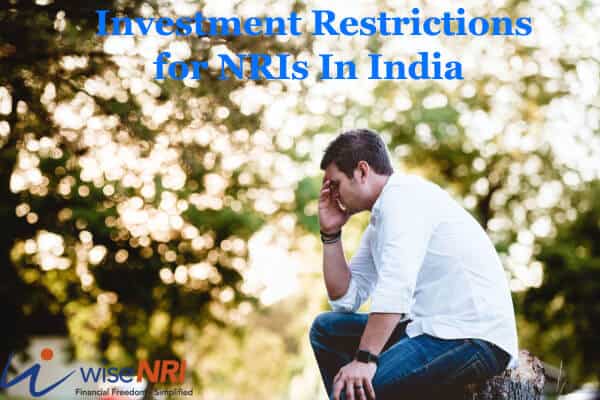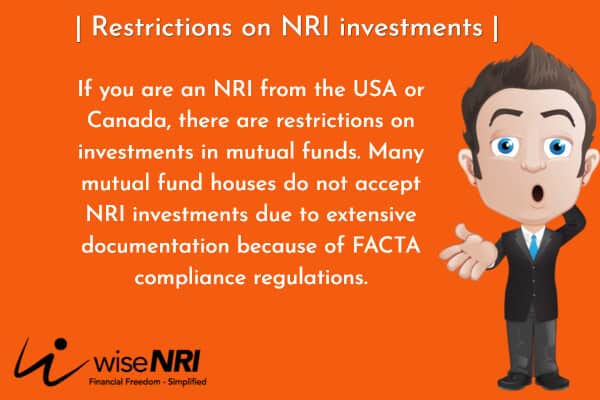Investments made by non-resident Indians (NRIs) are usually treated as ‘foreign investments’ and are governed by the Indian foreign exchange regulations. Over time, these regulations have been liberalized, but there are some avenues wherein NRIs cannot invest or partake in like resident Indians. We have highlighted the restrictions on NRI investments here:

Check – 10 Best NRI Investment Options in India
Investment Restrictions for NRI
- NRIs cannot have residential banking accounts. When a person becomes an NRI, the banking accounts have to be converted to an NRO account.
- As an NRI, you can continue with the PPF account that you opened when you were a resident Indian. However, the PPF account cannot be extended after the maturity period of 15 years. An NRI is not allowed to open a PPF account in India.
- If you are an NRI from the USA or Canada, there are restrictions on investments in mutual funds. Many mutual fund houses do not accept NRI investments due to extensive documentation because of FACTA compliance regulations.
- NRIs cannot invest in the equity market or mutual fund schemes using their residential Demat account. They have to open a Portfolio Investment Scheme account (PIS) with a broker and use that to buy and sell investments.
- Even with a PIS account, NRIs cannot engage in all trading activity. For example, NRIs cannot engage in intraday trading in stock markets. Short selling is not allowed for NRIs. As an NRI, you can invest in only up to 10% of the paid-up capital of an Indian company. NRIs may be barred from investing in certain stocks and sectors, as per RBI mandates.
- NRIs are not allowed to trade in currency derivatives and commodities.
- NRIs and OCIs are not allowed by law to purchase lands or plantation property, or farmhouses in India unless they acquire special permission from RBI.

Must Check –NRI Investments in Commercial Property
So How can NRIs invest in India?
- You can open a Non-Resident (External) Rupee Account (NRE), a Non-Resident Ordinary (NRO), and/or Foreign Currency Non-Resident Account (FCNR) account with an Indian bank to manage your money in India.
- An NRI between the age of 18 years to 60 years can have an NRI NPS account with a POP (Point of Presence) in India. NRIs can also open an eNPS account with a PAN card or an Aadhaar Card.
- NRIs from most countries can invest in mutual fund schemes. These are some of the Mutual fund houses that accept investments from NRIs, even from the USA and Canada:
-
- Aditya Birla Sun Life Mutual Fund
- SBI Mutual Fund
- UTI Mutual Fund
- ICICI Prudential Mutual Fund
- TATA Mutual Fund
- L&T Mutual Fund
- PPFAS Mutual Fund
- Sundaram Mutual Fund
- Reliance Mutual Fund
- Franklin Templeton Mutual Fund
Check – NRI KYC For Mutual Funds
Do check with the mutual fund house before you start the process of investing on regulations related to Investment restrictions for NRI.
- NRIs can invest in equity by opening a PIS account that is associated with an NRE or NRO account.
- NRIs can invest in equity futures and options using an NRO account and getting a Custodial Participant (CP) code.
- NRIs can purchase immovable property such as residential or commercial property in India.
- NRIs can subscribe to corporate deposits, NCDs, and PSU bonds issued in India if the issuer specifically enables the ‘NRI Window’ in an offer.
Though there are some Investment restrictions for NRI, NRIs can invest in India. There are some processes and documentation that you will have to follow to invest once you become an NRI. But once the initial work is done, it is pretty seamless, and participate and take advantage of the India growth story.
All successful investing is Goal Focused & Planning Driven. All failed investing is market-focused & return-driven.
If you agree – let’s talk about YOUR Goals & Plan.
If you have any questions or views related to investment restrictions for NRIs – add them in the comment section.

Hi I am NRI with OCI card & want to do some business in India
Hi Sunil,
Yes, you can do .
Can I buy adani power stocks?
Hi Shivraj,
Yes, you can buy Adani Power stocks if you have a trading or demat account with a registered stockbroker in India.
Can NRI invest in regular income plans offered by Insurance Companies? Can they get credit in their NRE account directly? Any restriction or permission needed?
Hi Dipak
Yes, you can invest but the amount will be credited to NRO Account.
You Have stated “As an NRI, you can continue with the PPF account that you opened when you were a resident Indian. However, the PPF account cannot be extended after the maturity period of 15 years. An NRI is not allowed to open a PPF account in India’.
While this is correct, the period of 15 years as mentioned above may have to be relooked into.
As per my understanding A NRI can continue with an existing PPF account that has not yet matured ,in the initial 16 year period of maturity or in any extension of 5 year block thereafter.
Howver the NRI can only continue the existing PPF account opeanrd by him ,before he became a NRI ,till maturity.
This can be technically of any period.
My son had an existing PPF which matured after 15 years, was extended twice for a block of 5 years each, and he became a NRI during the second block extension.He was allowed to keep his PPF till maturity of the second block period till the 25th year.
So maybe the 15 year period stated by you may lead to some confusion.Have a look.
NRIs can buy Non Repatriable MF linked with NRO account and no PIS ?
Hii Hari
NRI can invest in mutual funds from an NRO account.
How about a detailed article on investment in Mutual Funds & ETFs by NRIs specifically covering US, Canada and other countries seperately, whether online is available, whether physical presence is required in India while investing, if nominee is an NRI how would transmission be effected etc etc It would be of great use as would clear lot of conflicting views of Bank RMs, Advisors, Distributors etc
Hi RP,
Already in the pipeline. 🙂
Are you sure Franklin Templeton allows investment from US & Canada – when we called they said no. Not only that they also informed us that even if a nominee is Non-Resident then on death of holder Franklin Templeton would carry out transmission by compulsorily redeeming the units and would not transfer the units in name of Non Resident nominee. Would appreciate your expertise as well as experience if any of readers
Advice on UK based NRI doing crypto trading bot activity on crypto exchange. What is the best way to fund the crypto exchange account – through my NRE account or direct crypto transfer from foreign crypto exchange to my wazirx account and then transfer to crypto trading bot. Also, what are the tax implications in India and UK on withdrawing funds to my NRE account and then using those for either further investment in India or transferring to my UK bank account? Thanks
Is HUF income taxable in the US?
Hi Sam
Yes, the HUF income will be taxable in US.
Useful. Thanks
Can you transfer money from your NRO account ( all receipts came from indian rupee transactions) to your NRE or FCNR account without a CA certificate?
Hi Naresh
Sorry, but you can’t transfer the money without the CA Certificate.